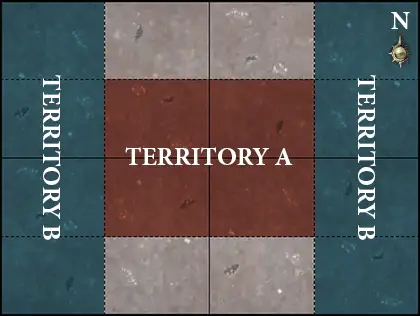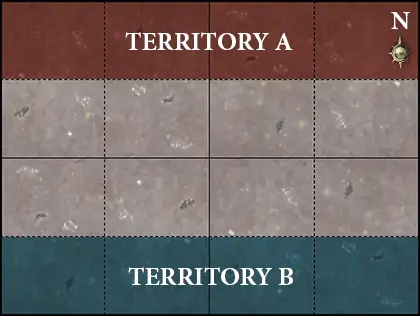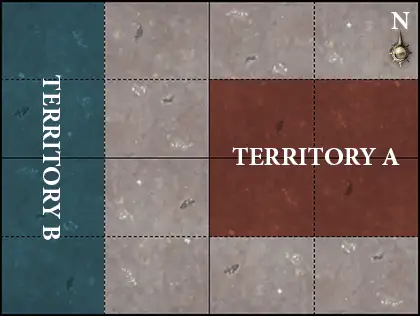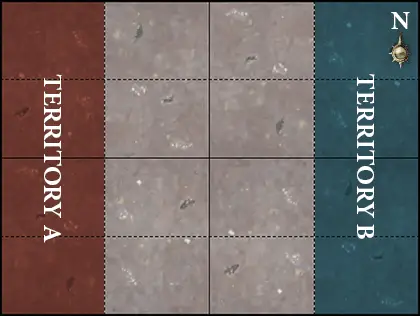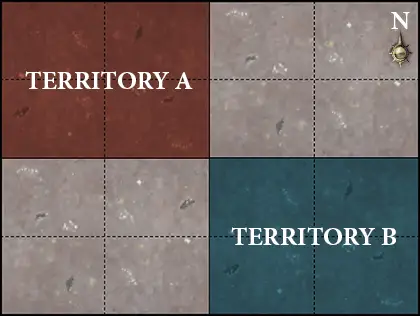Thondia
Welcome, rugged warlord, to the feral expanse of Thondia. This land is found in the realm of Ghur, and has become the epicentre of a ferocious new period of war: the Era of the Beast. The tome you now hold in your hands is your key to join these desperate battles, and perhaps decide the fate of Thondia.
Contents | ||
Books
| Book | Kind | Edition | Last update | |
 Season of War: Thondia Season of War: Thondia | ||||
 Season of War: Thondia Season of War: Thondia | Expansion | 3 | January 2023 | |
FAQ
| Q: | Does an incarnate heal all of the wounds allocated to it in the battleshock phase, regardless of the result of the roll to determine whether its level is reduced? |
| A: | Yes. |
| Q: | The Summons to War battlepack states that ‘Neither player can include faction terrain features in their army.’ However, no such restriction is stated in the Strife in Thondia battlepack. Please can you confirm if faction terrain features can be used in the Strife in Thondia battlepack? |
| A: | You can use faction terrain features as normal in the Strife in Thondia battlepack, unless the battleplan being used states that only certain players are allowed to set up faction terrain features. In these battleplans, only the specified players can set up faction terrain features. |
| Q: | If an ability prevents an endless spell from being dispelled (e.g. the Disciples of Tzeentch battle trait ‘Arcane Armies’), can I use the Krondspine Incarnate of Ghur’s ‘Devour Endless Spell’ monstrous rampage and pick that endless spell? |
| A: | No. |
Season of War: Thondia is focused upon one of the central regions in Ghur, the Realm of Beasts. Thondia is a vast alpha-continent, a largely untamed expanse dominated by a single pitiless dichotomy - that of predator and prey. Thondia has already played a key role in many Age of Sigmar tales, but here we examine the region in more depth than ever.
In the wake of the battle at Amberstone Watch - where the heroic Stormcast Eternals and malicious Kruleboyz orruks clashed for the first time - strange occurrences have been blighting Thondia. Yndrasta, Sigmar’s huntress, has been dispatched to uncover the cause of these calamities and put a stop to them. Yet many enemies seek to impede the Celestial Spear - and Ghur itself has unleashed a terrifying new threat in the form of the Krondspine Incarnates, elemental constructs formed of monstrous bone and pure beast-magic.
Realm rules allow you to represent the unique dangers of Thondia, offering new challenges to overcome and adding another level of flavour to your battles. Equally exciting are rules for fielding a Krondspine Incarnate. Every army in Warhammer Age of Sigmar can be accompanied by one of these savage entities, and their power is a boon to any commander. Yet an incarnate is no mindless servant, and they have an animalistic will of their own...
The rest of the gaming content in Season of War is broken up into battlepacks, making it incredibly customisable and easy to understand. You can use a battlepack by itself along with the core rules to enjoy a full experience, or combine your favourite elements with those from other battlepacks of the same mode of play - open, narrative or matched - to create the tabletop battles you and your friends are looking for.
Season of War’s open play content is intended to make setting up a battle as easy as possible. A new battleplan generator allows you to create games themed around Ghur in record time, containing objectives, twists, and cunning ruses that embody the nature of war in the Realm of Beasts.
Narrative gamers will find a Path to Glory battlepack designed around campaigns in Thondia. New battleplans, quests and rewards allow you to simulate the building of your Ghurish domains, while the Anvil of Apotheosis section of this expansion grants options for creating your own monster-hunting heroes. The narrative play section also includes a Summons to War battlepack, designed around recreating the story presented in Season of War: Thondia. Bespoke battleplans highlight each flashpoint moment of the campaign, and they are supplemented by warscroll battalions that add character and depth to the key protagonists of the story in this book.
The matched play battlepack in Season of War: Thondia is centred around creating a fun competitive framework for games set in this region of the Realm of Beasts. New grand strategies, battle tactics and core battalions allow greater variety than ever in tailoring your force - and you will need them, for a series of Thondia-themed battleplans will test your generalship to its limits. The Strife in Thondia battlepack has been designed with events in mind. Organisers will find this battlepack to be a valuable resource, whether by running it as presented here or by taking advantage of its modular design and combining it with other matched play content to create their ultimate event.
Season of War: Thondia is an exciting new development for Warhammer Age of Sigmar, both in terms of the ongoing narrative and the game. The Era of the Beast has truly begun, and nothing will ever be the same again in the Mortal Realms. Will you fall, torn down by the fury of Ghur, or will you instead marshal your armies and rise, stepping forth to become a legendary name in the annals of the Age of Sigmar?
Region of War: Thondia
The following realm rules can be used for battles fought in Thondia, in the Realm of Beasts. Some battleplans will require you to use one or more of these rules, and players can also agree to use any of them in any battle if they wish to do so.
Realmsphere Magic
All WIZARDS know the following spell in addition to any others that they know:Metamorphosis: The wizard channels the wild soul of Ghur to transform a chosen ally into a monstrous beast.
Metamorphosis is a spell that has a casting value of 5 and a range of 12". If successfully cast, pick 1 friendly HERO that is not a MONSTER and that is within range and visible to the caster. That HERO gains the MONSTER keyword until your next hero phase.
Realm Command
Each player can use the following command ability in addition to any others that they can use:Feral Roar: Channelling the spirit of Ghur, the commander looses a roar that sees monsters of all shapes and sizes fight on without heed of injury or pain.
You can use this command ability at the start of the combat phase. The unit that receives the command must be a MONSTER. Until the end of that phase, when you look up a value on that unit’s damage table, it is treated as if it has not suffered any wounds.
Monstrous Denizens
The great monsters of Ghur are legendary, both for their sheer biodiversity and the challenge that hunting any of them provides. Yet every pack-hunter, scavenger, and even herbivore that roams Ghur has adapted to brave their harsh environment, usually through slaughtering anything that could pose a threat.After the battlefield has been set up but before territories have been assigned, the players roll off. The winner can set up 1 MONSTER within 3" of the centre of the battlefield. This model is referred to as a monstrous denizen. Any MONSTER from any faction can be chosen. It is not part of either player’s army.
At the start of each battle round, before determining priority, the players roll off. In that battle round, the winner of the roll-off treats the monstrous denizen as a unit in their army and their opponent treats it as an enemy unit. The monstrous denizen’s commanding player can choose to attack it, but if they do, until the end of the battle round, they treat it as an enemy unit and their opponent treats it as a unit in their own army. The monstrous denizen cannot attack itself.
Monstrous Mounts
If the monstrous denizen is a mount, then it does not have a rider. This means that it can only attack using the mount’s weapons, and it can only use abilities that apply to the mount and not those that apply to the rider. The players will need to decide which abilities can be used when the monstrous denizen is set up; if they cannot agree, they must roll off and the winner decides.Incarnates
An incarnate can be chosen as a monstrous denizen. If it is, it starts the battle in its wild form.Thondia Mysterious Terrain
The flora of Ghur is no less aggressive than the fauna. Carnivorous plants abound, and can grow to devour even an adult human whole. The more cunning species, like the Gnarloak, are adept at faking a dormant or even dead state before preying on any who stray close with gnashing wooden maws and sharp, impaling branches.When you roll on the Mysterious Terrain table, use the Thondia Mysterious Terrain table below instead of the one in the core rules.
| ||||||||||||||||
OPEN PLAY
War in Thondia Battlepack
The War in Thondia battlepack is based upon the Open War battlepack from the Core Book, but the rules have been modified to represent battles taking place in this region of the Realm of Beasts.
Points Limit
The players must first agree on a points limit for the battle. The points limit can be any number and determines the number of points you have available to spend on your army. The points limit also determines the recommended minimum battlefield size and recommended minimum number of terrain features for the battle, as shown in the table below.
| ||||||||||||||||
| The points value of a unit can be found on its Pitched Battle profile (see section 25.4 of the core rules). | ||
| Remember that you can include 1 faction terrain feature in your army (see section 1.4.1 of the core rules). Faction terrain features do not cost any points. | ||
Faction Terrain
Faction terrain features are set up according to the rules in their faction’s battletome. If it is impossible for a faction terrain feature to be set up, then it is not used.Battalions
You can include warscroll battalions and core battalions in your army.Realm Rules
You must use the realm rules for Thondia. However, the Thondia Mysterious Terrain and Monstrous Denizens rules are only used if a result rolled on the Twist table instructs you to do so.The Battlefield
Before the battleplan is generated, the players roll off. The winner sets up the terrain features for the battlefield. The number of terrain features that are set up is determined by the size of the battlefield, as shown on the War in Thondia table.Terrain features must be set up more than 3" from the edge of the battlefield and more than 6" from all other terrain features. If it is impossible for a terrain feature to be set up, it is not used.
War in Thondia Battleplan Generator
The battleplan for a War in Thondia battle is generated using the War in Thondia battleplan generator below. The battleplan generator is made up of four tables, which determine where the armies are set up (the Map table), what the players must do in order to win the battle (the Victory table), and the special rules that apply to the battle (the Twist and Ruse tables). After the players have picked their armies, resolve the following steps to generate the battleplan:| When rolling on the Ruse table, we recommend hiding the dice under an upturned cup. Reveal your roll to your opponent when you want to use the ruse. | ||
Deployment
After the battleplan has been generated, the player who did not set up the battlefield s terrain features chooses which player uses Territory A and which player uses Territory B, and which long edge of the battlefield is the northern edge. The players then alternate setting up units one at a time, starting with the player who won the roll-off to set up the terrain features. Each player must set up their units wholly within their territory and more than 6" from their opponent’s territory.The players continue to set up units until both armies have been set up. If one player finishes setting up their army first, their opponent must set up the rest of the units in their army, one after another.
Game Length
The battle ends at the end of the fifth battle round unless noted otherwise in the victory condition.Map Table
|
|
Victory Table
|
Twist Table
| The twist is a rule that applies to each player during the battle. The twist can have a significant impact on the battle, depending on the types of units the players have included in their armies. | ||
|
Ruse Table
| Before the battle, each player rolls on the Ruse table. Your ruse may prove to be a valuable ‘ace in the hole’ when you need it the most! | ||
|
Arcane Prize Table
| The Arcane Prize table is only used if you roll the ‘Arcane Prize’ result on the Victory table. The true nature of the prize is only revealed once one army seizes it. As always, there is a certain amount of risk involved in meddling with ancient relics... | ||
|
NARRATIVE PLAY
Thondia Path to Glory Battlepack
The following battlepack allows you to fight Path to Glory battles in Thondia. Winning a battle in Thondia will allow you to establish an outpost, from which you can send out exploratory expeditions.
Establishing an OutpostIf you win a battle using this battlepack, you can establish an outpost in Thondia, as long as this does not cause you to exceed the maximum number of outposts you are allowed to have (you can have up to 1 outpost if you have a stronghold, up to 2 outposts if you have an imposing stronghold, and up to 3 outposts if you have a mighty stronghold).The outpost is established in the territory you generate in step 6 of the aftermath sequence. If you cannot or do not wish to add that territory to your roster, then you cannot establish the outpost. If you do decide to establish the outpost, add a note beside that territory on your roster saying it is a ‘Thondian outpost" when you add it to your roster. Outpost BenefitsIf you have a Thondian outpost on your roster, you can pick Thondia veteran abilities, prime monster abilities and Thondia Territories, and you can mount Thondia scouting expeditions. You can do so in the aftermath sequence of any future battle, even one for which you did not use this battlepack. | ||
Points Limit
The players must first agree on a points limit for the battle. The points limit can be any number and determines the number of points you have available to spend on your army. No more than half of your points can be spent on a single unit. All units added to your army must be taken from your Path to Glory roster. The points limit also determines the recommended minimum battlefield size and recommended minimum number of terrain features for the battle, as shown in the table below.
| ||||||||||||||||
| A good way to set the points limit for the battle is to first determine who has the lowest total points’ worth of units on their order of battle. Take that number and round it up to the nearest hundred: the result is the points limit for the battle. For example, if one player were able to field 1200 points’ worth of units but the other player were only able to field 680 points’ worth of units, the points limit for the battle would be 700. The points limit could be lower than that, of course, if the players agreed. | ||
Faction Terrain
Each battleplan in this battlepack will state if faction terrain can be set up and which players can do so. Faction terrain features must be set up more than 3" from all other terrain features and more than 3" from all objectives. These restrictions are in addition to the set-up rules in the battletome in which they appear. If it is impossible for a faction terrain feature to be set up, then it is not used.| The battleplans in this battlepack each revolve around an exciting narrative. As such, you will only be able to include faction terrain when it is narratively appropriate to do so. | ||
Battalions
You can include warscroll battalions and core battalions in your army.Thondia Path to Glory Battleplans
One player rolls on the following table to determine which battleplan is used for the game. Alternatively, the players can agree on which battleplan to use.
|
Special Rules
The following special rule applies to the battle:Beastslayer
If an attack made by a friendly HERO destroys a MONSTER, that HERO can issue the All-out Attack command in that phase without a command point being spent, and even if you have already used the All-out Attack command ability in that phase.Thondia Quests
When you pick a quest, you can pick from the following quests in addition to any others you can pick from.QUEST Bonding with an incarnate is no easy task. The elemental ritual that creates the bond can only be carried out if certain requirements have been met, and must be sealed upon the field of battle. Pick 1 HERO on your roster and write their name down in the Quest Reward section of your quest log. At the end of each Path to Glory battle, add 1 quest point to the progress section of your quest log if any enemy HEROES were slain by attacks made by the HERO you picked, or if any enemy HEROES were slain by mortal wounds caused by that HERO’s abilities, a spell cast by that HERO or a prayer chanted by that HERO.Once you have gained 3 or more quest points, you complete this quest. When you complete this quest, you can add a Krondspine Incarnate of Ghur to your order of battle that is bonded to the HERO you picked when you embarked on this quest. If that HERO is removed from your order of battle, the incarnate is also removed. | ||
QUEST You have heard rumours of a powerful new champion whose exploits are becoming the stuff of legend. If you can track them down, you may be able to convince them to join your army. Write down on your quest log the number of destiny points you wish to spend on an Anvil of Apotheosis HERO: 10, 15, 20, 25, 30, 35 or 40 destiny points.At the end of each Path to Glory battle, add 1 quest point to the progress section of your quest log for each friendly unit wholly within your opponent’s territory. In addition, at the end of each Path to Glory battle, you can spend 1 glory point to add 1 additional quest point. You complete this quest when you have 1 quest point for every 5 destiny points that you wished to spend on your HERO. You can then create the HERO and add them to your order of battle. | ||
Thondia Veteran Abilities
Each time a unit on your Path to Glory roster gains a veteran ability, if you have a Thondian outpost, you can pick from the following veteran abilities in addition to any others you can pick from. You can only give 1 unit a Thondia veteran ability in each aftermath sequence.
|
Prime Monster Abilities
Prime monster abilities can only be used in battles in which all players are using Path to Glory armies. In addition, no more than 1 friendly unit can use a prime monster ability per turn.
|
Thondia Territories
If you have a Thondian outpost and make an exploration roll of 61-66 in the aftermath sequence, you can bring the corresponding territory from the Thondia Territories table below under your control instead of a territory from any other Territories table. Some of these territories allow you to send a unit to them. A unit cannot be sent to more than 1 territory in each aftermath sequence, and any such units cannot be picked for the ‘Borderlands’ territory in the Core Book.
|
Thondia Scouting Expeditions
If you send a unit on a scouting expedition, roll a dice (called an expedition roll) and look up the what the scouts encountered during the expedition on the Expedition table below. You can re-roll the dice if the scout unit has a Move characteristic of 12" or more. Follow the instructions for the encounter in the list below.
| ||||||||||||||||
Thondia Encounters
Barrens: Roll a dice. On a 2+, the expedition is a failure and nothing is discovered. On a 1, the scouts come across a rampaging gargant. Roll the dice again. On a 1-5, you must increase the scout unit’s casualty score by D3. On a 6, the scout unit slays the gargant and earns D3 renown points.
Frontier Settlement: Roll a dice. On a 1-2 the settlement is hostile and you must increase the scout unit’s casualty score by D3. On a 3-4, it is friendly, and you gain D3 glory points. On a 5+, it becomes your ally, and you can increase your Allied Units limit by 1.
Mountains: Unless the scout unit can fly, the expedition is a failure and nothing is discovered. If the scout unit can fly, roll a dice. On a 2+, the scout unit is able to map a route across the mountains and earns 1 renown point. On a 1, the scout unit is ambushed by a Maw-krusha. Roll the dice again. On a 1-5, you must increase the scout unit’s casualty score by D3. On a 6, the scout unit defeats the Maw-krusha and earns D3 renown points.
Sea: This tempestuous ocean is far too dangerous to cross. The expedition is a failure.
Stormvault: Roll a dice. On a 1-4, the scouts are unable to open the Stormvault and the expedition is a failure. On a 5+, the scouts are able to open the Stormvault, and you can add 1 endless spell or invocation available to your faction to your vault.
Swamp: Roll a dice. On a 3+, the scout unit is able to map a route through the swamp and earns 1 renown point. On a 2, the scout unit is ambushed by troggoths. Roll the dice again. On a 1-5, you must increase the scout unit’s casualty score by 1. On a 6, the scouts defeat the troggoths and earn 1 renown point. On a 1, the scout unit suffers heavy casualties from swamp gas and suffers D3 casualty points.
Wyldwood: Roll a dice. On a 2+, the scout unit is able to map a route through the Wyldwood and earns 1 renown point. On a 1, the scout unit is ambushed by angry spites. Roll the dice again. On a 1-5, you must increase the scout unit’s casualty score by 1. On a 6, the scouts defeat the spites and earn 1 renown point.
Battleplan Show of StrengthTwo armies meet after hunting each other for weeks. The place of battle is not one of strategic importance; instead, the goal of each force is a simple one: to leave the other bloodied and send a stark message as to who holds dominance in these lands. REALM RULES This battle uses the Realmsphere Magic and Realm Command realm rules.THE ARMIES Each player picks an army and then they roll off. The winner chooses which player is the attacker and which is the defender.THE BATTLEFIELD The players roll off. The winner sets up the battlefield’s terrain features and then the other player chooses which long edge of the battlefield is the northern edge. After the terrain features have been set up, starting with the player that won the roll-off, each player picks 1 terrain feature and rolls on the Thondia Mysterious Terrain table to determine which scenery rule applies to that terrain feature during the battle.FACTION TERRAIN The defender can set up a faction terrain feature.DEPLOYMENT The attacker sets up their army first, wholly within their territory and more than 12" from enemy territory. Then, the defender sets up their army wholly within their territory and more than 12" from enemy territory.FIRST TURN The attacker chooses which player takes the first turn in the first battle round.BATTLE LENGTH The battle lasts for 5 battle rounds.GLORIOUS VICTORY When the battle ends, each player totals the points values of enemy units that were destroyed during the battle, excluding units that were added to the armies after the battle started. The player with the highest total wins a minor victory. If the model that player picked to be their general is still on the battlefield, they win a major victory instead.
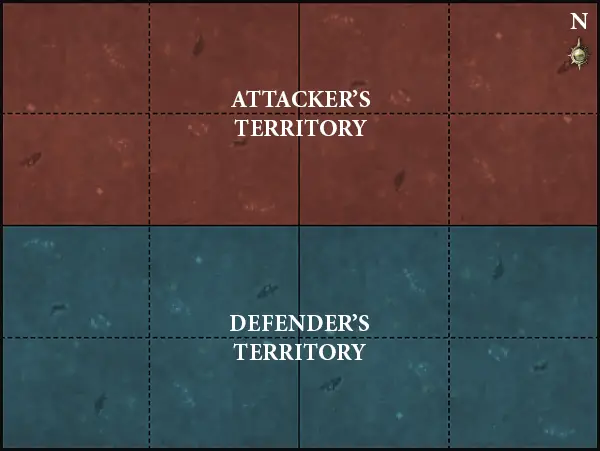 | |||||||||||
Battleplan The HuntAfter tracking them for weeks, one force has run to ground a contingent of the enemy, and now has them surrounded. However, as they close in to deliver the killing blow, war horns blare behind them - it seems the would-be hunters are, in fact, the hunted... REALM RULES This battle uses the Realmsphere Magic and Realm Command realm rules.THE ARMIES Each player picks an army and then they roll off. The winner chooses which player is the hunter and which is the quarry.CONTINGENTS The hunter must split their army into a bait contingent and a reinforcements contingent. The reinforcements contingent must have more units than the bait contingent.THE BATTLEFIELD The players roll off. The winner sets up the battlefield’s terrain features and then the other player chooses which long edge of the battlefield is the northern edge.After the terrain features have been set up, starting with the player that won the roll-off, each player picks 1 terrain feature and rolls on the Thondia Mysterious Terrain table to determine which scenery rule applies to that terrain feature during the battle. FACTION TERRAIN The hunter can set up a faction terrain feature.DEPLOYMENT The hunter sets up their bait contingent first, wholly within their territory and wholly within 6" of the centre of the battlefield.Units in the bait contingent cannot be set up in reserve. The reinforcements contingent starts the battle in reserve and will arrive as described below. Then, the quarry sets up their army wholly within their territory and more than 9" from all enemy units. FIRST TURN The hunter chooses which player takes the first turn in the first battle round.REINFORCEMENTS From the start of the second battle round, at the end of the hunter’s movement phase, they can set up any of their reserve units wholly within 7" of any battlefield edge and more than 3" from all enemy units.BATTLE LENGTH The battle lasts for 5 battle rounds.GLORIOUS VICTORY When the battle ends, each player totals the points values of enemy units that were destroyed during the battle, excluding units that were added to the armies after the battle started. The player with the highest total wins a minor victory. If the model that player picked to be their general is still on the battlefield, they win a major victory instead.
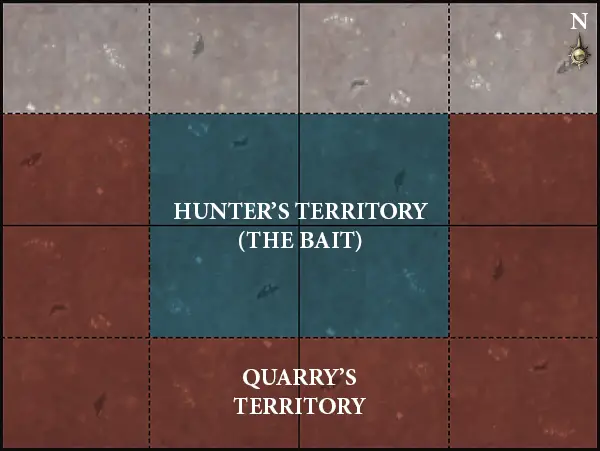 | |||||||||||
Battleplan Close the JawsOne army is on the run, deep in enemy territory - but as they think they have finally escaped, the enemy enclose on all sides like a deadly beast closing its jaws on the neck of its prey. REALM RULES This battle uses the Realmsphere Magic and Realm Command realm rules.THE ARMIES Each player picks an army and then they roll oif. The winner chooses which player is the hunter and which is the quarry.THE BATTLEFIELD The players roll off. The winner sets up the battlefield’s terrain features.FACTION TERRAIN Neither player can set up a faction terrain feature.DEPLOYMENT The player who did not set up the battlefield s terrain features chooses which long edge of the battlefield is the northern edge. The hunter sets up their army first, anywhere on the battlefield that is more than 15" from enemy territory. Then, the quarry sets up their army wholly within their territory.BATTERED SURVIVORS After the quarry sets up a unit, they must roll a dice for each model in that unit. On a 1, if that model’s unit had 2 or more models when it was set up, that model is slain. If that model was a single model unit when it was set up, then it suffers D6 mortal wounds on a roll of 1 instead.FIRST TURN The hunter chooses which player takes the first turn in the first battle round.ESCAPE At the start of the hunter’s hero phase, any units in the quarry’s army that are wholly within 5" of the escape edge and more than 3" from all units in the hunter’s army can escape. Remove units that have escaped from play. The models in those units do not count as having been slain.BATTLE LENGTH The battle lasts for 5 battle rounds.GLORIOUS VICTORY When the battle ends, each player totals the points values of enemy units that were destroyed during the battle, excluding units that were added to the armies after the battle started. The quarry adds the points value of any of their units that escaped to their score. The player with the highest total wins a minor victory. If the model that player picked to be their general is still on the battlefield or has escaped, they win a major victory instead.
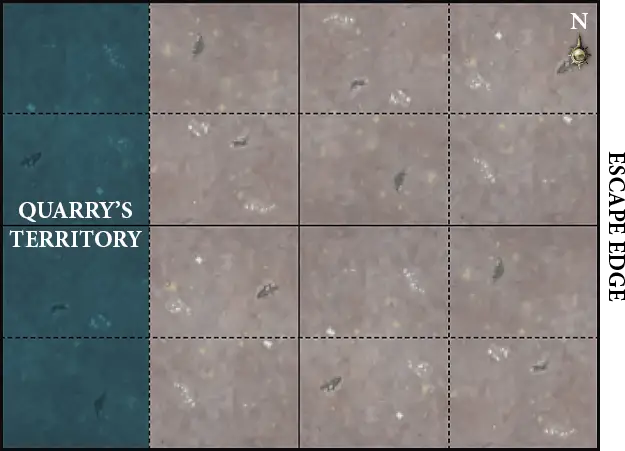 | |||||||||||
Battleplan The Beast’s LairTwo armies converge on the lair of one of the monstrous denizens of Ghur. Each side wants to slay the creature, in order to be able to carve up its prodigious body for valuable resources. REALM RULES This battle uses the Monstrous Denizens, Realmsphere Magic and Realm Command realm rules.THE ARMIES Each player picks an army.THE BATTLEFIELD The players roll off. The winner sets up the battlefield’s terrain features and then the other player chooses which long edge of the battlefield is the northern edge, and in which territory each army will be set up.After the terrain features have been set up, starting with the player that won the roll-off, each player picks 1 terrain feature and rolls on the Thondia Mysterious Terrain table to determine which scenery rule applies to that terrain feature during the battle. FACTION TERRAIN Neither player can set up a faction terrain feature.DEPLOYMENT The players roll off. The loser sets up their army first, wholly within their territory. Then, the winner sets up their army wholly within their territory.BATTLE LENGTH The battle lasts for 5 battle rounds.GLORIOUS VICTORY When the battle ends, each player totals the points values of enemy units that were destroyed during the battle, excluding units that were added to the armies after the battle started. The player with the highest total wins a minor victory. If the monstrous denizen was slain by an attack made by a unit from that player’s army, they win a major victory instead.
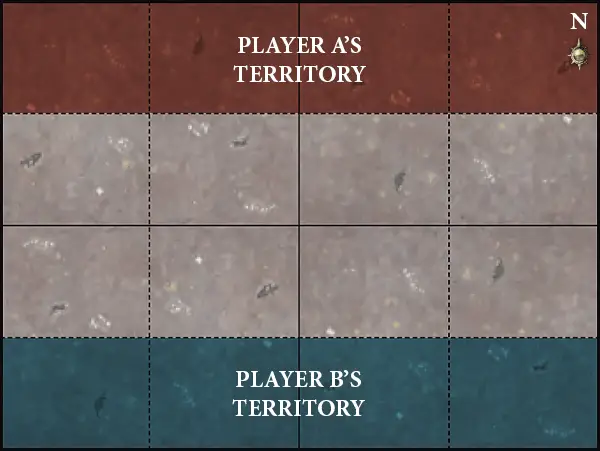 | |||||||||||
Battleplan Open the VaultTwo armies converge upon an ancient vault, but to seize the treasure within, each army has to not only defeat their rival, but also overcome the malign guardian that protects the vault from all intruders. THE ARMIES Each player picks an army.REALM RULES This battle uses the Realmsphere Magic and Realm Command realm rules.THE BATTLEFIELD The first terrain feature that is set up must be set up at the centre of the battlefield. That terrain feature is the vault. Then, the players roll off. The winner sets up the rest of the battlefield’s terrain features, and then the other player chooses which long edge of the battlefield is the northern edge and in which territory each army will be set up.After the terrain features have been set up, starting with the player that won the roll-off, each player picks 1 terrain feature and rolls on the Thondia Mysterious Terrain table to determine which scenery rule applies to that terrain feature during the battle. FACTION TERRAIN Neither player can set up a faction terrain feature.DEPLOYMENT The players roll off. The loser sets up their army first, wholly within their territory. Then the winner sets up their army wholly within their territory.THE MALIGN GUARDIAN The loser of the deployment roll-off picks 1 predatory endless spell or 1 Krondspine Incarnate of Ghur and sets it up within 3" of the centre of the battlefield.Guardian Endless Spell: Any endless spell can be picked. During the battle, this endless spell remains wild and cannot be dispelled, removed from play or moved off the edge of the battlefield. Guardian incarnate: This incarnate starts the battle in its wild form. At the start of each battle round, after making the priority roll, the players roll off again. The winner treats the incarnate as being a wild form incarnate that is part of their army for that battle round. BATTLE LENGTH The battle lasts for 5 battle rounds.OPENING THE VAULT At the start of your hero phase, if you control the vault, you can attempt to open it. To do so, roll a dice. Add 1 to the roll for each friendly WIZARD and friendly PRIEST within 6" of the vault. On a 6+, the vault is opened.GLORIOUS VICTORY When the battle ends, if the vault has been opened, the player that controls it wins a major victory. If the vault has not been opened the player that controls it wins a minor victory. If neither player controls the vault, the battle is a draw.
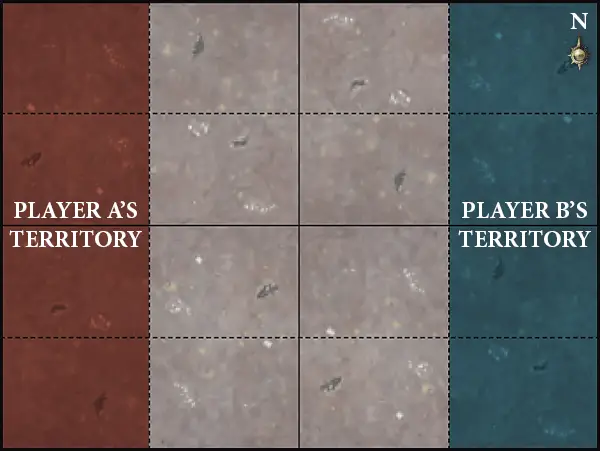 | |||||||||||
Battleplan Defend the SettlementA beleaguered garrison mans the defences of a settlement, awaiting the final assault by the enemy. As dawn breaks, war horns resound in the distance as a mighty horde gathers before the settlement, threatening to overwhelm those brave enough to hold their ground. REALM RULES This battle uses the Realmsphere Magic and Realm Command realm rules.THE ARMIES Each player picks an army. If one player has an Imperilled Stockade territory and the other does not, then the player with the Imperilled Stockade is the guardian and the other player is the invader. If neither players has an Imperilled Stockade territory, or both do, then they roll off. The winner chooses which player is the invader and which is the guardian.THE BATTLEFIELD The guardian sets up 1 terrain feature at each of the 3 points shown on the map below. These terrain features are referred to as the battlements. If the guardian can set up a faction terrain feature at any of the 3 points shown on the map, they can choose a faction terrain feature to be one of the battlements.The players then roll off and the winner sets up the rest of the battlefield’s terrain features so that each terrain feature is more than 9" from all of the battlements. After the terrain features have been set up, starting with the player that won the roll-off, each player picks 1 terrain feature and rolls on the Thondia Mysterious Terrain table to determine which scenery rule applies to that terrain feature during the battle. FACTION TERRAIN If the guardian did not set up a faction terrain feature as a battlement, they can set up a faction terrain feature as normal. The invader cannot set up a faction terrain feature.DEPLOYMENT The guardian sets up their army first, wholly within their territory and more than 8" from enemy territory. Then, the invader sets up their army wholly within their territory and more than 8" from enemy territory.FIRST TURN The invader chooses which player takes the first turn in the first battle round.BATTLE LENGTH The battle lasts for 5 battle rounds.GLORIOUS VICTORY When the battle ends, if one player controls all the battlements, they win a major victory. Otherwise, the player that controls the most battlements at the end of the battle wins a minor victory.FATE OF THE IMPERILLED STOCKADE If the defender has an Imperilled Stockade territory and they lose the battle, the Imperilled Stockade upgrade is removed and the territory reverts to a Collapsed Ruins territory.
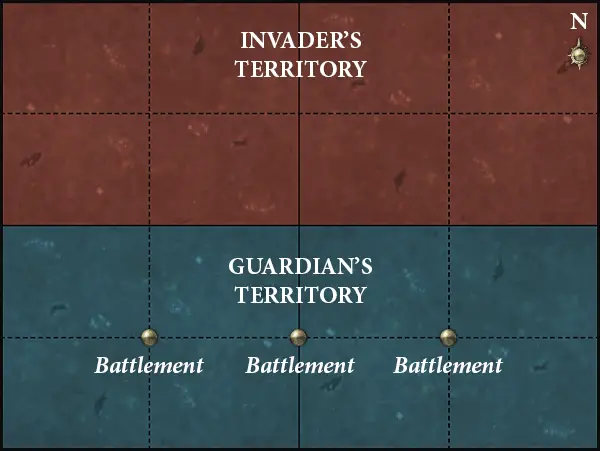 | |||||||||||
The Anvil of Apotheosis: Ghur
In the vaults of high Sigmaron, the Stormcast Eternals are forged upon the Anvil of Apotheosis. Across the realms can be found similar champions of all races and allegiances, each having endured their own crucible of testing and each possessing quirks and qualities that have seen them rise to power.
There are 6 steps outlined in this section that you must follow to create your own hero. As you follow the steps, you will have a host of options to choose from, including powerful weapons and ferocious mounts. After completing all of the steps, you will be able to field your hero in your games of Warhammer Age of Sigmar. The 6 steps are as follows:
- Set a destiny point limit for your hero.
- Choose your hero’s ancestry.
- Equip your hero with weapons from the armoury.
- Pick an archetype for your hero: Commander, Mage or Acolyte.
- Choose a bestial companion (if any) for your hero.
- Spend your remaining destiny points on any characteristic enhancements or abilities for your hero.

Characteristic Enhancements and Abilities
Many of the steps include options to give your hero a [Characteristic Enhancement] or an [Ability]. If the option gives a [Characteristic Enhancement], modify the characteristic as noted. If it gives an [Ability], write the ability in the ‘Abilities’ section of your hero’s warscroll. The same characteristic enhancement can be chosen up to 3 times for your hero; however, the same ability cannot be chosen more than once. In addition, some options will have restrictions that limit which keywords can or cannot take a certain option.Step 1 - The Destiny Point Limit
When creating your hero, the first step is to pick 1 of the following destiny point limits for your hero:Champion
Limit: 20 destiny points
Conqueror
Limit: 40 destiny points
Hero Quest
Limit: Number of destiny points recorded on quest log
As you complete the rest of the steps, each option you pick for your hero will cost a certain number of destiny points. This will often be abbreviated as DP. Keep a running tally of the number of destiny points you have spent. The tally cannot exceed the limit you have set.
Step 2 - Ancestries
The second step is to pick the ancestry for your hero. There are 24 to choose from in total, from Aelf to Daemon to Stormcast Eternal and so forth. The ancestry you pick will cost a number of destiny points (as indicated in the upper-right corner of the ancestry) and will populate your hero’s Move, Wounds, Bravery and Save characteristics. The ancestry will also give them a set of keywords. Write all of these down on your hero’s warscroll after making your choice. If the ancestry includes the <ARMY> keyword, you must pick 1 of the army keywords listed for that ancestry.Aelf
ARMY | <Daughters of Khaine>, <Idoneth Deepkin>, <Lumineth Realm-lords>, <Cities of Sigmar> |
Bonesplitterz Orruk
Bullgor
Daemon
ARMY | <Blades of Khorne>, <Disciples of Tzeentch>, <Maggotkin of Nurgle>, <Hedonites of Slaanesh> |
Deathmage
Dragon Ogor
Duardin
ARMY | <Cities of Sigmar>, <Fyreslayers> <Kharadron Overlords> |
Grot
Human
Ironjawz Orruk
Malignant
Mordant
Mortal
ARMY | <Blades of Khorne>, <Disciples of Tzeentch> <Maggotkin of Nurgle>, <Hedonites of Slaanesh>, <Slaves to Darkness> |
Ogor
ARMY | <BEASTCLAW RAIDERS>, <GUTBUSTERS> |
Ossiarch Bonereaper
Saurus
Skaven
ARMY | <Masterclan>, <Clans Pestilens, Nurgle> <Clans Verminus>, <Clans Skryre>, <Clans Moulder>, <Clans Eshin> |
Kruleboyz Orruk
Skeleton
Skink
Stormcast Eternal
Vampire
Sylvaneth
Step 3 - The Armoury
- 1 one-handed melee weapon.
- 2 one-handed melee weapons.
- 1 one-handed melee weapon and a shield.
- 1 two-handed melee weapon.
- 1 Handbow and 1 one-handed melee weapon.
- 1 Bow and 1 one-handed melee weapon.
In step 6, you will be presented with options to improve your hero’s weapons.
| ||||||||||||||||||||||||||||||||||||||||||||||||||||||||||||||||||||||||||||||||||||||||
| ||||||||||||||||||||||||||||||||||||||||||||||||||||||||||||||||||||||||||||||||||||||||||||||||||||||||||||||||||||||||||||||||||||||||||||||||||||||||||
| ||||||||||||||||||||||||||||||||||||||||||||||||||||||||||||||||||||||||||||||||
| ||||||||||||||||||||||||||||||||||||||||||||||||||||||||||||||||||||||||||||||||||||||||||||||||||||||||||||||||||||||||||||||||||||||||||||
| ||||||
Step 4 - Archetypes
Next, you need to pick 1 of the following archetypes for your hero and then any associated abilities. There are 3 archetypes to choose from: Commander, Acolyte or Mage. Each of these will unlock different types of abilities for your hero. Commanders have access to command abilities, Acolytes have access to prayers and Mages have access to spells. Archetypes do not cost any destiny points.
| ||||||||||
| ||||||||||
|
Step 5 - Bestial Companion
A Gargantuan Beast is a truly colossal mount, such as a Dragon, Thundertusk or Manticore. If you do not want to choose a bestial companion for your hero, you can skip this step.
You can pick 1 of the following bestial companions. Each costs a number of destiny points as listed in the table.
| ||||||||||||||||||||||||||||||||||||||||||
| ||||||||||||||||||||||||||||||||||||||||||||||||||||||
| ||||||||||||||||||||||||||||||||||||||||||
| ||||||||||||||||||||||||||||||||||||||||||||||||||||||
| |||||||||||||||||||||||||||||||||||||||||||||||||||||||||||||||||||
| |||||||||||||||||||||||||||||||||||||||||||||||||||||||||||||||||||||||||||||||
| |||||||||||||||||||||||||||||||||||||||
Step 6 - Characteristic Enhancements and Abilities
The final step is to pick any other options for your hero. Each costs a number of destiny points as listed in the tables below.
| |||||||||||||||||||||||||||||||||||||||
| |||||||||||||||||||||||||||||||||
Using Your Hero in Battle
If you are allowed to include your hero in your army, count the number of destiny points you have spent on your hero and multiply the total by 10. This is the Pitched Battle points value of that hero. In addition, your hero has the Leader battlefield role, unless it has the MONSTER keyword, in which case it has the Leader and Behemoth battlefield roles.
Path to Glory: You can add a hero to your order of battle if you complete the ‘Hero Quest’.
Tournaments: If you are taking part in a matched play tournament, you are only allowed to use your hero if the tournament organisers have specifically said that Anvil of Apotheosis heroes can be used.
Summons to War Battlepack
The following battlepack contains rules, warscroll battalions and battleplans that allow you to recreate the battles described in the narrative section of this book. The battlepack can be used to fight either one-off battles or a campaign where all five battleplans in the battlepack are played in sequence, one after the other.
Points Limit
The players must first agree on a points limit for the battle. The points limit can be any number and determines the number of points you have available to spend on your army. No more than half of your points can be spent on a single unit. The points limit also determines the recommended minimum battlefield size and recommended minimum number of terrain features for the battle, as shown in the table below.
|
Summons to War Battleplans
If the players are fighting a campaign, then these battleplans are used one after the other, starting with battleplan 1. If they are not fighting a campaign, then either one player rolls on the following table to determine which battleplan is used, or the players can agree on which battleplan to use.
|
Faction Terrain
Neither player can include faction terrain features in their army.Battalions
This battlepack includes five warscroll battalions that are based on some of the leaders and battle formations described earlier on this page. They are included as part of the armies in the following battleplans, and can also be used with battlepacks that allow the inclusion of warscroll battalions in an army. In addition, the players can include core battalions in their armies.Special Rules
The following special rules apply to the battle:Thondia Mysterious Terrain
The Thondia Mysterious Terrain table is used as detailed in each battleplan.Alternating Deployment
If a battleplan says that the players use alternating deployment, then the players alternate setting 1 unit at a time. The players continue to set up their units until both armies have been set up. If one player finishes setting up their army first, their opponent must set up the rest of the units in their army, one after another.Summons to War Campaign
Two players can fight a Summons of War campaign by fighting the battleplans in this battlepack in the order in which they appear. For the duration of the campaign, one player is the destroyer and the other is the defier.Destroyer’s Armies
The destroyer will need to be able to field the following armies, battalions and units:Call of the Beast: Da Snorter’s Kop Rukk
Savagery and Slaughter: Big Waaagh! army. Da Snorter’s Kop Rukk, The Weeping Fangz
Impending Doom: Bonesplitterz army
Blood in the Pass: Beasts of Chaos army, The Butcher-herd
The Heart of the Beast: Bonesplitterz army. Da Snorter’s Kop Rukk, Krondspine Incarnate of Ghur
Defier’s Armies
The defier will need to be able to field the following armies, battalions and units:Call of the Beast: The Weeping Fangz
Savagery and Slaughter: Beasts of Chaos army, The Butcher-herd
Impending Doom: Stormkeep army; Yndrasta, the Celestial Spear; Lord Vorst’s Retinue; Godsmaw’s Vanguard; at least 1 CITIES OF SIGMAR unit
Blood in the Pass: Stormcast Eternals army; Yndrasta, the Celestial Spear; Lord Vorst’s Retinue; Godsmaw’s Vanguard
The Heart of the Beast: Stormcast Eternals army; Yndrasta, the Celestial Spear; Godsmaw’s Vanguard
Designer’s Note: If you don’t have all of the armies or units needed to fight a battle, just substitute suitable units that you do have for the ones that you don’t. It’s up to you to decide what you think would be appropriate replacements!
Consequences of Battle
Unique units that are slain in a campaign battle are assumed to have been hurt but not killed, and they will be fully recovered in time for the next battle unless noted otherwise. This aside, the result of an earlier battle may have an impact on subsequent battles, as explained below. If you are allowed to add units to your army, they must conform to the Unit Selection restrictions for the battleplan being used (if any).Savagery and Slaughter: If Brokkagok or Da Snorter, were slain in Call of the Beast, they do not take part in this battle.
Impending Doom: If the destroyer won a major victory in Savagery and Slaughter, add 200 points to the points limit of their army. If the defier won a major victory in Savagery and Slaughter, subtract 200 points from the points limit of the destroyer’s army.
Blood in the Pass: If the defier won a major victory in Impending Doom, add 200 points to the points limit of their army. If the destroyer won a major victory in Impending Doom, subtract 200 points from the points limit of the defier’s army.
The Heart of the Beast: If Yndrasta was slain in Blood in the Pass, she does not take part in this battle. If the defier won a major victory in Blood in the Pass, add Lord Vorst’s Retinue to the defier’s army.
Campaign Victory
If one player is victorious in Impending Doom, Blood in the Pass and The Heart of the Beast, they win a total campaign victory. If one player is victorious in Blood in the Pass and The Heart of the Beast, they win a strategic campaign victory. In any other circumstances, the victor in The Heart of the Beast wins a tactical campaign victory.Warscroll Battalions
These warscroll battalions are included as part of the armies in the following battleplans. They can also be used with battlepacks that allow the inclusion of warscroll battalions in an army.
Warscroll Battalion 
| ||||||||||||
ORGANISATION | ||||||||
| ||||||||
Add 2 to the Attacks characteristic of Ghorraghan Khai’s Fetish Staff. In addition, if the unmodified hit roll for an attack made with Ghorraghan Khai’s Fetish Staff is 6, that attack inflicts D3 mortal wounds on the target and the attack sequence ends (do not make a wound or save roll).
Add 1 to hit rolls for attacks made by WARHERD units in this battalion that are wholly within 12" of Ghorraghan Khai.
Warscroll Battalion 
| ||||||||||||||||
ORGANISATION | ||||||||||||
| ||||||||||||
Units in this battalion have a 6+ ward. If a unit in this battalion is wholly within 6" of an objective, it has a 5+ ward instead of a 6+ ward.
Warscroll Battalion 
| ||||||||||||
ORGANISATION | ||||||||
| ||||||||
Units in this battalion cannot be picked when your opponent carries out a monstrous rampage.
Add 1 to the Wounds characteristic of the Pallador-Prime in this battalion.
Warscroll Battalion 
| ||||||||||||
ORGANISATION | ||||||||
| ||||||||
If Brokkagok is on the battlefield at the start of the first battle round, before determining who has the first turn, you can pick 1 friendly KRULEBOYZ unit and set it up again anywhere on the battlefield that is more than 9" from all enemy units.
At the start of the combat phase, you can pick 1 unit in this battalion that is within 3" of any enemy units: the strike-last effect applies to that unit in that phase. If you do so, you can pick 1 other unit in this battalion that is within 3" of any enemy units: the strike-first effect applies to that unit in that phase.
Warscroll Battalion 
| ||||||||||||
ORGANISATION | ||||||||
| ||||||||
You can re-roll ward rolls of 1 for models in this battalion.
Once per battle, at the start of your hero phase, you can pick 1 spell from the Lore of the Savage Beast that Da Snorter does not know and has not attempted to cast during the battle. He can attempt to cast that spell in that hero phase in addition to any other spells that he can attempt to cast.
Battleplan Call of the BeastIn the wake of the struggle at Amberstone Watch, Gazog’s Kruleboyz had dispersed across Thondia. While many greenskins had retreated to the Morruk Hills, pursued by vengeful bands of Stormcasts, others had fled into the Drowned Lands. There, a new calling would find them... REALM RULES This battle uses the Realmsphere Magic, Realm Command and Monstrous Denizens realm rules. However, instead of there being 1 monstrous denizen, there are 2. Each must be set up within 3 of the centre of the battlefield. As long there are 2 monstrous denizens on the battlefield, the player who wins the monstrous denizen roll-off must pick 1 monstrous denizen to control, and their opponent controls the other one.TEMPORARY TRUCE In this battle, the players cannot pick units in their opponent’s army as the target of attacks. In addition, if the effect of an ability other than the abilities of the monstrousdenizens would cause mortal wounds to a unit in a player’s army, those mortal wounds are negated. Designer’s Note: The armies are competing to take down the monstrous denizens, not each other! THE ARMIES One player is the destroyer and their opponent is the defier. The destroyer must use an army that consists of Da Snorter’s Kop Rukk. The defier must use an army that consists of The Weeping Fangz.THE BATTLEFIELD The players roll off. The winner sets up the battlefield’s terrain features and then the other player chooses which long edge of the battlefield is the northern edge. After the terrain features have been set up, starting with the player that won the roll-off, each player picks 1 terrain feature and rolls on the Thondia Mysterious Terrain table to determine which scenery rule applies to that terrain feature during the battle.DEPLOYMENT The players roll off. Then, they use alternating deployment, starting with the winner of the roll-off. Each player must set up their units wholly within their territory and more than 3" from both monstrous denizens.BATTLE LENGTH The battle lasts until both monstrous denizens have been slain.VICTORY POINTS A player scores 1 victory point each time a wound or mortal wound caused by a friendly unit is allocated to a monstrous denizen. In addition, a player scores 1 victory point each time a wound or mortal wound caused by a monstrous denizen is allocated to a unit in their opponent’s army.GLORIOUS VICTORY When the battle ends, a player wins a minor victory if their opponent’s general has been slain and their own general has not, or a major victory if they also have at least twice as many victory points as their opponent. If both generals have been slain, the battle is a draw. If neither general has been slain, the player with the most victory points wins a minor victory. Any other result is a draw.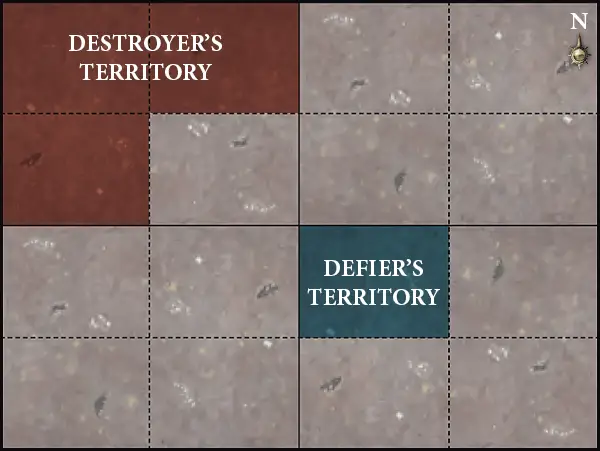 | ||
Battleplan Savagery and SlaughterKruleboyz scouts spotted caverns honeycombing the Krondspine foothills inhabited by Chaos beast-boyz. A massive cloud of dust heralded the approach of the bulk of the greenskin army. In response, a series of resonant horn-blasts echoed from the caves. They were followed by a disjointed chorus of snarls and brays, and a drove of loping figures emerging into the light. The beast men were coming! REALM RULES This battle uses the Realmsphere Magic and Realm Command realm rules.THE ARMIES One player is the destroyer and their opponent is the defier.The destroyer must use a Big Waaagh! army that includes The Weeping Fangz and Da Snorter’s Kop Rukk. Da Snorter must be the general. Designer’s Note: If Brokkagok or Da Snorter are not taking part in battle, the destroyer can still use the battalion abilities of The Weeping Fangz or Da Snorters Kop Rukk. In addition, if Da Snorta is not taking part in the battle, then Brokkagok must be the general of the destroyer’s army. The defier must use a Beasts of Chaos army that includes The Butcher-herd. Ghorraghan Khai must be the general. THE BATTLEFIELD The players roll off. The winner sets up the battlefield s terrain features and then the other player chooses which player uses Territory A and which player uses Territory B.After the terrain features have been set up, starting with the player that won the roll-off, each player picks 1 terrain feature and rolls on the Thondia Mysterious Terrain table to determine which scenery rule applies to that terrain feature during the battle. DEPLOYMENT The players roll off. They then use alternating deployment, starting with the winner of the roll-off. Each player must set up their units wholly within their territory.BATTLE LENGTH During this battle, the players must keep track of the number of bestial fury points that have accumulated. Each time a unit finishes a charge move, each time a unit is destroyed, and each time a spell is successfully cast or unbound, add 1 to the number of bestial fury points that have accumulated. At the end of each battle round, each player rolls a dice, and the two rolls are added together. If the total is less than the number of bestial fury points that have accumulated, there is a massive explosion of arcane energy, and the battle ends.VICTORY POINTS Each player scores 1 victory point each time a friendly unit unbinds a spell or dispels an endless spell. Each player scores 1 extra victory point if the friendly unit is their general, and 1 extra victory point if the spell that was unbound was cast by the enemy general, or the endless spell that was dispelled was summoned by the enemy general.GLORIOUS VICTORY At the end of the battle, if one player has scored more victory points than their opponent, they win a major victory. If neither player has won a major victory, each player adds up the points values of all enemy units that have been destroyed. If one player’s total is higher, they win a minor victory. Any other result is a draw.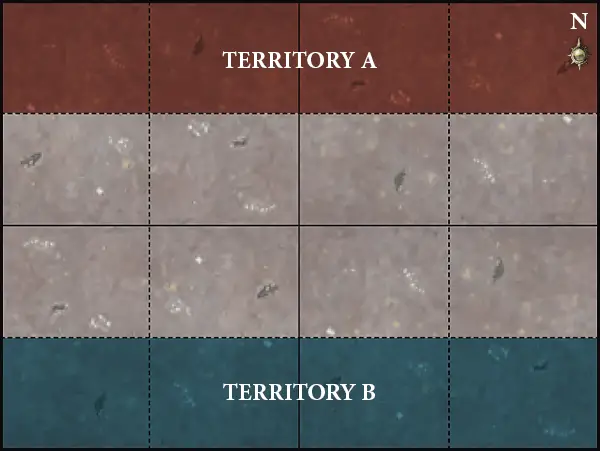 | ||
Battleplan Impending DoomLord Vorst was surprised to find a Sigmarite strongpoint near the Krondspine foothills. The Lord-Imperatant had believed that every Dawnbringer venture sent so far from Excelsis had met with disaster, but this one had survived - albeit, with a throng of Bonesplitterz now assailing them. THE ARMIES One player is the destroyer and their opponent is the defier.The destroyer must use a Bonesplitterz army that does not include The Weeping Fangz or Da Snorter’s Kop Rukk. The army cannot have a general. The defier must use a Stormkeep army that includes the following units and warscroll battalions. Yndrasta must be the general.
THE BATTLEFIELD First, the defier sets up 6 terrain features. Each terrain feature must be more than 6" from the defier’s territory, more than 3" from the battlefield edge, and more than 9" from all other terrain features. Then the defier sets up 5 terrain features wholly within their own territory. One of these terrain features must be a Cleansing Aqualith.DEPLOYMENT The defier sets up their CITIES OF SIGMAR units first, wholly within their territory. The destroyer sets up their army second, wholly within their territory and more than 6" from the defier’s territory. All of the remaining units in the defier’s army are set up in reserve as the relief force.FIRST TURN The destroyer chooses which player takes the first turn in the first battle round.THE RELIEF FORCE At the end of their first movement phase, the defier rolls a dice to see from which direction the relief force arrives. On a 1-2, it arrives from the eastern battlefield edge. On a 3-4, it arrives from the southern battlefield edge. On a 5-6, it arrives from the western battlefield edge. All of the units in the relief force must be set up wholly within 6" of the battlefield edge it arrived from and more than 9" from all enemy units.HEALING WATERS At the start of their hero phase,- a player can heal D3 wounds allocated to each friendly model that is within 1" of the Cleansing Aqualith.SACRED TO SIGMAR Add 2 to the Bravery characteristic of STORMCAST ETERNALS and CITIES OF SIGMAR units that are wholly within 12" of the Cleansing Aqualith.BATTLE LENGTH The battle lasts for 5 battle rounds.GLORIOUS VICTORY When the battle ends, if a player controls 3 or more terrain features that are wholly within the defier’s territory, and at least one of them is the Cleansing Aqualith, they win a major victory. If a player controls 3 or more terrain features that are wholly within the defier’s territory but does not control the Cleansing Aqualith, they win a minor victory. Any other result is a draw.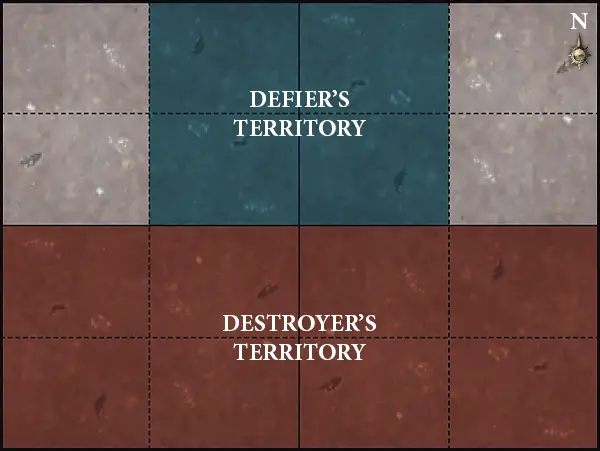 | ||
Battleplan Blood in the PassWhat had been a hunt for the Stormcast Eternals was now a race against time - their mission, to find the magical construct pulsing power across the region and end it. Yet as they travelled through the twisting passes of the Krondspine Range, none of Sigmar’s chosen expected an easy time of it. they were to be proven correct. THE ARMIES One player is the destroyer. Their opponent is the defier. The destroyer must use a Beasts of Chaos army that includes The Butcher-herd. Ghorraghan Khai must be the general. In addition, the destroyer’s army must include The Weeping Fangz. The Weeping Fangz are treated as allies; the normal limit on the number of allied units that can be included in the army are ignored, but no other allies may be taken.The defier must use a Stormcast Eternals army that includes the following units and warscroll battalions. Yndrasta must be the general. THE BATTLEFIELD The players roll off. The winner sets up the battlefield’s terrain features and then the other player chooses which long edge of the battlefield is the northern edge. After the terrain features have been set up, starting with the player that won the roll-off, each player picks 1 terrain feature and rolls on the Thondia Mysterious Terrain table to determine which scenery rule applies to that terrain feature during the battle.DEPLOYMENT The defier sets up their army first, wholly within their territory and more than 6" away from enemy territory. Then, the destroyer sets up their army wholly within their territory and more than 6" from enemy territory. At least 1 unit from the destroyer’s army must be set up wholly within each small rectangular section of their territory.ESCAPE At the end of each battle round, any units in the defier’s army that are wholly within 7" of an escape edge and more than 3" from all enemy units can leave the battle. Remove units that have escaped from play. The models in those units do not count as having been slain.BATTLE LENGTH The battle lasts for 5 battle rounds.GLORIOUS VICTORY When the battle ends:- If at least half of the defier’s units have escaped, the defier wins a major victory. - If none of the defier’s units have escaped, the destroyer wins a major victory. - If at least one but less than half of the defier’s units have escaped, and Yndrasta has escaped, the defier wins a minor victory. - If at least one but less than half of the defier’s units have escaped, and Yndrasta has been slain, the destroyer wins a minor victory. - Any other result is a draw. 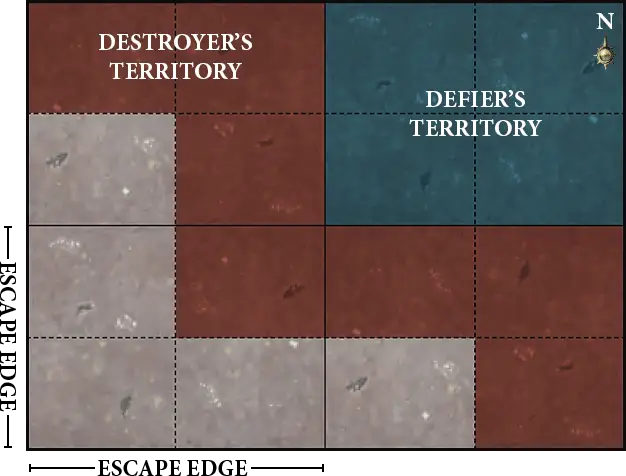 | ||
Battleplan The Heart of the BeastYndrasta had advanced deep into the Krondspine Range, harried at seemingly every turn by the awakening wrath of Ghur. There, deep in the mountains, she would find her quarry: an incarnate born of unleashed bestial magic, and the orruks that now revered it. If she did not act now, all would be lost. THE ARMIES One player is the destroyer. Their opponent is the defier. Do not use points limits for this battle. Instead, the destroyer must use a Bonesplitterz army that consists of Da Snorter’s Kop Rukk and a Krondspine Incarnate of Ghur. Da Snorter must be the general.The defier must use a Stormcast Eternals army that consists of Yndrasta, the Celestial Spear, and Godsmaw’s Vanguard. Yndrasta must be the general. Designer’s Note: If Yndrasta is not taking part in the battle, the Pallador-Prime in Godsmaw’s Vanguard must be the general. THE BATTLEFIELD The players roll off. The winner sets up the battlefield’s terrain features and then the other player chooses which long edge of the battlefield is the northern edge. After the terrain features have been set up, starting with the player that won the roll-off, each player picks 1 terrain feature and rolls on the Thondia Mysterious Terrain table to determine which scenery rule applies to that terrain feature during the battle.DEPLOYMENT The destroyer sets up their army first, wholly within their territory and more than 6" away from enemy territory. Da Snorter and the Krondspine Incarnate of Ghur must be set up wholly within the small rectangular section of their territory that is furthest from enemy territory (see map). Then the defier sets up their army wholly within their territory and more than 6 from enemy territory.BATTLE LENGTH The battle lasts until only one player has any units on the battlefield at the end of a turn, ignoring the Krondspine Incarnate of Ghur.GLORIOUS VICTORY When the battle ends, ignoring the Krondspine Incarnate of Ghur, the player that has any units left on the battlefield wins a minor victory if their general has been slain, or a major victory if their general has not been slain.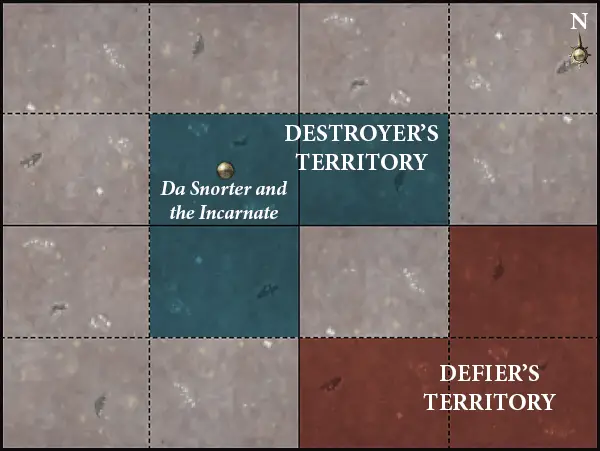 | ||
MATCHED PLAY
Strife in Thondia Battlepack
This battlepack presents a matched play campaign set in the Ghurish continent of Thondia. It can be played by two or more players, and is an ideal campaign for a gaming club or event. The players fight five battles in the order they are presented below. The player that scores the most victory points is the winner of the campaign.
- First, you must agree with the other players on a points limit for the campaign.
- Next, you must pick 1 faction for your army and consult the Strife in Thondia table to see the restrictions that apply when picking your units.
- Record the details of your army on your army roster. This includes the grand strategy you have selected, the units you have included and the enhancements you have picked for them.
- You must fight five battles using the Strife in Thondia battleplans, in the order in which they appear on this page. You must use the same army in each of the battles. You can fight each battle against any other player that is taking part in the campaign, but if six or more players are taking part, you cannot play against the same opponent more than once.
- After each battle, record your progress in the campaign on the Strife in Thondia scoring sheet. Once all players have fought their five battles, the player that has scored the most points is the winner of the campaign.
1. Points Limit
At the start of the campaign the players need to agree on a points limit for the battles. The points limit for the battles can be either 1000 or 2000. After you have agreed on a points limit, look it up on the Strife in Thondia table below. The table lists the restrictions on what the players can include in their armies.
| |||||||||||||||||||||||||||||||||
2. Pick Your Army
Next, you must pick your army following the restrictions below.Faction
You must pick 1 faction for your army. All of the units in your army must be from a single faction.Battlefield Roles
The Strife in Thondia table lists the minimum number of Leader and Battleline units you must include in your army and the maximum number of Leader, Behemoth and Artillery units you can include in your army.| Remember that allied units are ignored when determining if the units in the army are from a single faction (core rules, 27.1). | ||
Your general must have the Leader battlefield role. A model that has both the Leader and Behemoth battlefield roles counts as 1 Leader and 1 Behemoth in your army. If a unit has both the Battleline and Behemoth battlefield roles, that unit does not count toward the maximum number of Behemoth units you can include in your army.
Battalions
You can include core battalions in your army but you cannot include warscroll battalions.Understrength and Reinforced Units
The Strife in Thondia table lists how many reinforced units you can include in your army. Only Battleline units can be reinforced twice. You cannot include understrength units in a Strife in Thondia army.Allied Units
The maximum number of points that you can spend on allies from your points allowance is shown on the Strife in Thondia table. Allied units do not count towards the number of Battleline units in your army. However, they do count towards the maximum number of Leader, Behemoth and Artillery units in your army.Coalition Units
Coalition units do not count towards the number of Battleline units in your army. However, they do count towards the maximum number of Leader, Behemoth and Artillery units in your army. In addition, Coalition units are ignored when determining if the units in your army are from a single faction.| Like allied units, coalition units are units from another faction that can be included in your army without preventing you from using your army’s allegiance abilities. Coalition units differ from allies in that they are more closely tied to your army’s faction. Thus, restrictions that apply to allies do not necessarily apply to coalition units; for instance, coalition units can be given enhancements. Examples of units that can be included in an army as ccalition units are Chaos Warriors with the Mark of Khorne in a Blades of Khorne army and Stormcast Eternals units in a Cities of Sigmar army. If an army can include coalition units, this will be explained in the allegiance abilities for the army’s faction. | ||
Endless Spells and Invocations
The Strife in Thondia table lists the maximum number of endless spells and invocations you can include in your army. You cannot include the same endless spell or invocation more than once in your army.3. Fill Out Your Army Roster
Once you have picked your army, record the details on your army roster and show it to your opponent before setting up your army at the start of the battle. Your roster must include a list of the units, battalions, endless spells and invocations in your army; what size the units are; which units are in each battalion; the army’s faction; the grand strategy you have picked; which units are allies; and which model is the army’s general.Use the Notes column on the roster to record the command models you have chosen for each unit, the spells and prayers that are known by the WIZARDS and PRIESTS in your army, any artefacts of power you have given to HEROES in your army, and the command trait you have chosen for your general. If your army includes any units that are given keywords when they are set up, such as units with a Mark of Chaos, these keywords must be written down when the unit is added to the roster.
Grand Strategies
When you are filling out your army roster, you can pick 1 grand strategy. Your grand strategy represents what your army is trying to accomplish, and achieving it can make all the difference in a closely fought battle. The rules for how to use grand strategies can be found here.4. To War!
After the players’ army rosters have been filled out, it’s time to determine the battleplan that you will use. In this section you will find special rules that apply to battles fought using this battlepack.Strife in Thondia Battleplans
The players must use the following battleplans. Each player must fight the battleplans in the order in which they appear on this page, as shown on the following table.
| |||||||||||||||
Battle Tactics
Battle tactics are secondary objectives that the armies can attempt to achieve as the opportunity presents itself during the battle. Each battle tactic you pick will give you a new goal for your army to aim for in each of your turns. The rules for how to use battle tactics can be found here.Terrain Features
The Strife in Thondia table lists the recommended minimum number of terrain features to be set up on the battlefield. Each terrain feature must be set up more than 3" from the battlefield edge, more than 6" from all other terrain features and more than 3" from all objectives. If it is impossible for a terrain feature to be set up, it is not used.| Some events will have battlefields with terrain features that have been set up before both players arrive at the table, or the position of terrain features may have been predetermined by a third party. If this is the case, the players roll off to determine who is the attacker and defender as normal, with the attacker picking the territory in which they wish to deploy and setting up the first unit. If a faction terrain feature must be set up before any other terrain features and the battlefield has already been set up by a third party, set up that faction terrain feature before territories are determined. | ||
Faction Terrain
Faction terrain features must be set up more than 3" from all other terrain features and more than 3" from all objectives. These restrictions are in addition to the set-up rules in the battletome in which they appear. If it is impossible for a faction terrain feature to be set up, it is not used.Mysterious Terrain
After the battlefield has been set up, the players must roll off. Starting with the winner of the roll-off, each player must pick 1 terrain feature and roll on the Thondia Mysterious Terrain table to determine which scenery rule applies to it. The players cannot pick a faction terrain feature, or a terrain feature that has already had a scenery rule generated for it.Alternating Deployment
If a battleplan says that the players use alternating deployment, then the players alternate setting 1 unit at a time. The players continue to set up their units until both armies have been set up. If one player finishes setting up their army first, their opponent must set up the rest of the units in their army, one after another.Core Battalions
You can include any of the following core battalions in your army in addition to those found in the core rules. In addition, you cannot include the same core battalion from those shown below more than once in your army.
|
|
|
| ||||||||||||||
Grand Strategies
After you have picked your army, you must pick 1 grand strategy from the list below and record it on your army roster. At the end of each battle, if you completed your grand strategy, you score a number of campaign victory points as shown on the scoring sheet.Lord of Incarnates: When the battle ends, you complete this grand strategy if there are any INCARNATES from your starting army on the battlefield that have not reverted to their wild form. Ruler of Mysteries: When the battle ends, you complete this grand strategy if you control more terrain features with a Thondia Mysterious Terrain scenery rule than your opponent. Monstrous Presence: When the battle ends, you complete this grand strategy if there are more MONSTERS from your starting army on the battlefield than there are MONSTERS from your opponents starting army on the battlefield. Pillars of Magic and Belief: When the battle ends, you complete this grand strategy if there are any WIZARDS or PRIESTS from your starting army on the battlefield. Sever the Head: When the battle ends, you complete this grand strategy if there are no HEROES from your opponent’s starting army on the battlefield. Hold the Line: When the battle ends, you complete this grand strategy if there are any Battleline units from your starting army on the battlefield. Vendetta: When the battle ends, you complete this grand strategy if the model chosen to be your opponent’s general has been slain and the model chosen to be your general has not been slain. | ||
Battle Tactics
At the start of your hero phase, you must pick 1 battle tactic from the list below. You must reveal your choice to your opponent, and if your battle tactic instructs you to pick something, you must tell your opponent what you pick. You have until the end of that turn to complete the battle tactic. You cannot pick the same battle tactic more than once per battle.Savaged Ranks: When you reveal this battle tactic, pick 1 Battleline unit from your opponent’s starting army on the battlefield. You complete this battle tactic if that unit is destroyed during this turn. If that unit was destroyed by an attack made by a friendly KRONDSPINE INCARNATE or an ability of a friendly KRONDSPINE INCARNATE, you count as having achieved 2 battle tactics instead of 1. Abolish It!: When you reveal this battle tactic, pick 1 enemy INCARNATE on the battlefield. You complete this battle tactic if that enemy INCARNATE is abolished during this turn. If that enemy INCARNATE was abolished by an attack made by a friendly INCARNATE or an ability of a friendly INCARNATE, you count as having achieved 2 battle tactics instead of 1.Thondia Conquer: When you reveal this battle tactic, pick 1 terrain feature with a Thondia Mysterious Terrain scenery rule and that is controlled by your opponent. At the end of this turn, you complete this battle tactic if you control that terrain feature. Destroy the Bonded: You complete this battle tactic if an enemy HERO bonded to an INCARNATE is slain during this turn. If that HERO was destroyed by an attack made by a friendly INCARNATE or an ability of a friendly INCARNATE, you count as having achieved 2 battle tactics instead of 1. Predatory Advance: When you reveal this battle tactic, pick 3 different units from your starting army on the battlefield. You complete this battle tactic if all of the units you picked run in the following movement phase and finish that run within 3" of each other. If 1 of those units is a KRONDSPINE INCARNATE and 1 is the HERO bonded to it, you count as having achieved 2 battle tactics instead of 1. Monstrous Dominance: At the end of the turn, you complete this battle tactic if there are at least 2 more friendly MONSTERS on the battlefield than there are enemy MONSTERS on the battlefield. If 1 or more of those friendly MONSTERS are INCARNATES, you count as having achieved 2 battle tactics instead of 1. Amber Spearhead: You complete this battle tactic if there are 2 or more units from your starting army wholly within your opponent’s territory at the end of this turn. If 1 or more of those units are KRONDSPINE INCARNATES, you count as having achieved 2 battle tactics instead of 1. | ||
Scoring Sheet
At the conclusion of a Strife in Thondia campaign, the player who has scored the most campaign victory points is declared the winner. Below we have provided a scoring sheet so that you can track the details of your battles, and which lists the ways in which campaign victory points are scored.
The final section is for recording the name of each of your opponents and the campaign victory points they scored in each battle.
Battleplan Clash in the BorderlandsThe borderlands between these two territories have been the site of fierce battles in recent weeks. Each side seeks to break through and raze the enemy territory that lies beyond. REALM RULES This battle uses the Realmsphere Magic and Realm Command realm rules.THE ARMIES Each player must use their campaign army. They then roll off, and the winner chooses which player is the attacker and which is the defender.THE BATTLEFIELD The defender sets up the number of terrain features shown on the Strife in Thondia table.DEPLOYMENT The attacker chooses which player uses Territory A and which player uses Territory B, and which long edge of the battlefield is the northern edge. The players then use alternating deployment, starting with the attacker. Each player must set up their units wholly within their territory.STEALING THE INITIATIVE Do not roll off to determine who has priority in the first battle round. Instead, the player who finished deploying their army first has priority in the first battle round.RAIDERS Each player has a raid edge marked on the map (the long edge of their opponent’s territory). At the end of each of their turns, players can pick any of their units that are within 3" of their raid edge and more than 3" from all enemy units to raid enemy territory. Remove units that raid enemy territory from play. Those units do not count as having been slain.Designer’s Note: If a unit raids enemy territory, make a note of whether it has less than half the models it started with. This is important when determining the victor. BATTLE TACTICS The players can pick from the following battle tactics in addition to Thondia Battle Tactics:Raiders: Pick 1 friendly unit. You complete this battle tactic if that unit raids enemy territory at the end of this turn. Blockade: Pick 1 enemy unit within 12" of your opponent’s raid edge. You complete this battle tactic if that unit has been destroyed by the end of this turn. BATTLE LENGTH The battle lasts for 5 battle rounds.GLORIOUS VICTORY At the end of the battle, each player totals the points values of the units in their army that raided enemy territory. If a raiding unit has less than half the models it started the battle with, it only contributes half its points value (rounding up) to the total. If one player’s total is at least 200 points higher, that player wins a major victory.If neither player wins a major victory, the player that completed the most battle tactics wins a minor victory. If both players completed the same number of battle tactics, then if only one player completed their grand strategy, that player wins a minor victory. Otherwise, the battle is a draw. 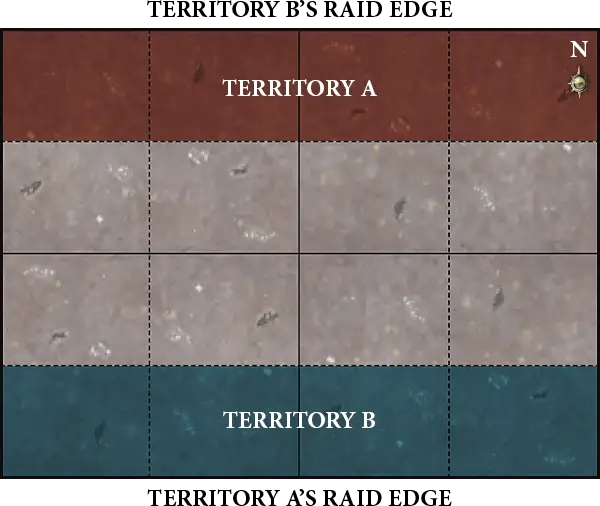 | ||
Battleplan The InvasionAfter a series of cross-border raids, one warlord begins to achieve dominance and decides to launch a full-scale invasion into their enemy’s territory. REALM RULES This battle uses the Realmsphere Magic and Realm Command realm rules.THE ARMIES Each player must use their campaign army. If one player won their last battle and their opponent did not, then the player that won their last battle is the attacker and their opponent is the defender. If one player lost their last battle and their opponent achieved a draw, then the player that lost their last battle is the defender and their opponent is the attacker. In any other circumstances, roll off, and the winner chooses which player is the attacker and which is the defender.THE BATTLEFIELD The defender sets up the number of terrain features shown on the Strife in Thondia table.DEPLOYMENT The attacker chooses which player uses Territory A and which player uses Territory B, and which long edge of the battlefield is the northern edge. The players then use alternating deployment, starting with the attacker. Each player must set up their units wholly within their territory and more than 12" from enemy territory.FACTION TERRAIN The defender is allowed to set up a faction terrain feature. If they do not have a faction terrain feature in their army, they can pick 1 terrain feature and pick 1 scenery rule from the Thondia Mysterious Terrain table to apply to it.FIRST TURN The attacker must take the first turn in the first battle round.BATTLE TACTICS The players can pick from the following battle tactics in addition to Thondia Battle Tactics:Occupy: You complete this battle tactic if you have any models wholly within your opponent’s territory at the end of this turn and your opponent does not have any models wholly within their territory at the end of this turn. Repel: You complete this battle tactic if there any enemy models wholly within your territory at the start of this turn and there are no enemy models wholly within your territory at the end of this turn. DOMINANT WARLORD Once per battle round, the attacker can use a command ability without a command point being spent if they pick their general to issue the command.BATTLE LENGTH The battle lasts for 5 battle rounds.GLORIOUS VICTORY At the end of the battle, a player controls a quarter of the battlefield if they have any units wholly within it and there are no enemy units wholly within it. If one player controls more quarters than their opponent, they win a major victory. If neither player wins a major victory, the player that completed the most battle tactics wins a minor victory. If both players completed the same number of battle tactics, then if only one player completed their grand strategy, that player wins a minor victory. Otherwise, the battle is a draw.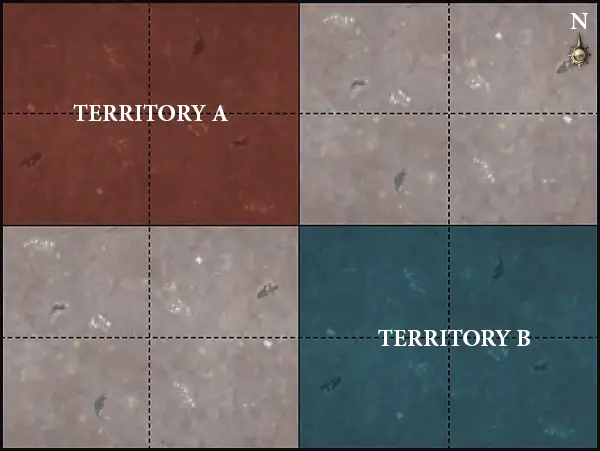 | ||
Battleplan The PrizeWord has reached the commanders that hidden amidst a set of ancient ruins is a powerful relic from the Age of Myth. The two armies race to be the one to secure it for themselves. REALM RULES This battle uses the Realmsphere Magic and Realm Command realm rules.THE ARMIES Each player must use their campaign army. If one player won their last battle and their opponent did not, then the player that won their last battle is the attacker and their opponent is the defender. If one player lost their last battle and their opponent achieved a draw, then the player that lost their last battle is the defender and their opponent is the attacker. In any other circumstances, roll off, and the winner chooses which player is the attacker and which is the defender.THE BATTLEFIELD The defender sets up the number of terrain features shown on the Strife in Thondia table. After the terrain features have been set up, starting with the defender, the players alternate picking 1 terrain feature to be a relic site, until there are 5 relic sites in total.DEPLOYMENT The attacker chooses which player uses Territory A and which player uses Territory B, and which long edge of the battlefield is the northern edge. The other territory is the defender’s territory. The players then use alternating deployment, starting with the attacker. Each player must set up their units wholly within their territory.FIRST TURN The attacker must take the first turn in the first battle round.DOMINANT WARLORD Once per battle round, the attacker can use a command ability without a command point being spent if they pick their general to issue the command.DISCOVERING THE RELIC After deciding who has priority at the start of each battle round, the loser of the priority roll must pick 1 relic site and roll a dice. If the score is higher than the number of the current battle round, that terrain feature is no longer a relic site. If the score is equal to or less than the number of the current battle round, the relic is hidden in that terrain feature and all other terrain features are no longer relic sites.If there is only one relic site left on the battlefield, the relic is automatically hidden in that terrain feature. BATTLE LENGTH The battle lasts for 5 battle rounds.GLORIOUS VICTORY At the end of the battle, one player wins a major victory if they control the terrain feature in which the relic is hidden and there are no enemy models within 6" of that terrain feature.If neither player wins a major victory, the player that completed the most battle tactics wins a minor victory. If both players completed the same number of battle tactics, then if only one player completed their grand strategy, that player wins a minor victory. Otherwise, the battle is a draw. 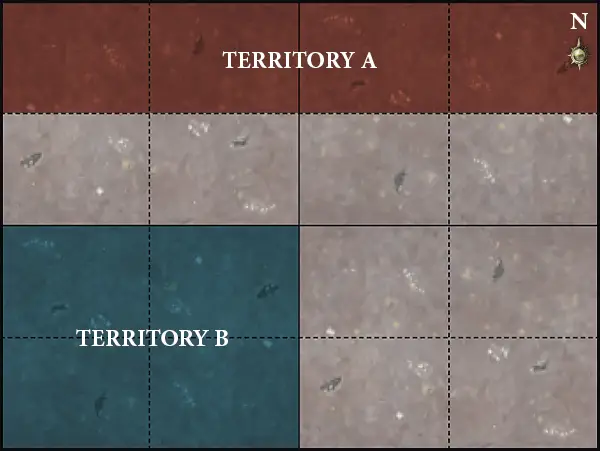 | ||
Battleplan The TrapWith the ancient relic in their possession, the victors are intent on returning to their homeland with their prize, unaware that they are heading into a trap. REALM RULES This battle uses the Realmsphere Magic and Realm Command realm rules.THE ARMIES Each player must use their campaign army. If one player won their last battle and their opponent did not, then the player that won their last battle is the attacker and their opponent is the ambusher. If one player lost their last battle and their opponent achieved a draw, then the player that lost their last battle is the ambusher and their opponent is the attacker. In any other circumstances, roll off, and the winner chooses which player is the attacker and which is the ambusher.THE RELIC The attacker can give 1 universal artefact of power (core rules, 27.5.2) to a HERO in their army. This artefact of power is called the relic in the following rules. The relic can be given to a HERO even if they already have an artefact of power.THE BATTLEFIELD The ambusher sets up the number of terrain features shown on the Strife in Thondia table.FACTION TERRAIN The ambusher is allowed to set up a faction terrain feature. If they do not have a faction terrain feature in their army, they can pick 1 terrain feature and pick 1 scenery rule from the Thondia Mysterious Terrain table to apply to it.DEPLOYMENT The attacker chooses which long edge of the battlefield is the northern edge. Hie attacker sets up their army first, wholly within their territory. The attacker cannot set up units in reserve. Then, the ambusher sets up each unit in their army either wholly within their territory and more than 12" from all enemy units, or wholly within their territory, wholly on a terrain feature and more than 3" from all enemy units.AMBUSH The ambusher must decide who will have the first turn in the first battle round.STEALING THE RELIC If the HERO bearing the relic is slain, before the HERO is removed from play, the opposing player can give the relic to a HERO in their army that is within 3" of the slain model. If there are no eligible HEROES within 3" of the slain model, then the relic is lost.BATTLE LENGTH The battle lasts for 5 battle rounds.GLORIOUS VICTORY At the end of the battle, if a player has a HERO bearing the relic, that player wins major victory.If neither player wins a major victory, the player that completed the most battle tactics wins a minor victory. If both players completed the same number of battle tactics, then if only one player completed their grand strategy, that player wins a minor victory. Otherwise, the battle is a draw. 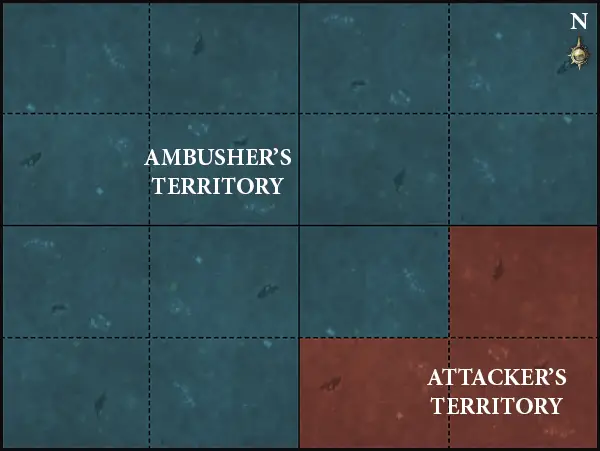 | ||
Battleplan Cut Off the HeadThe generals of these two forces, now bitter rivals, seek to defeat each other once and for all. REALM RULES This battle uses the Realmsphere Magic and Realm Command realm rules.THE ARMIES Each player must use their campaign army. If one player won their last battle and their opponent did not, then the player that won their last battle is the attacker and their opponent is the defender. If one player lost their last battle and their opponent achieved a draw, then the player that lost their last battle is the defender and their opponent is the attacker. In any other circumstances, roll off, and the winner chooses which player is the attacker and which is the defender.THE RELIC The attacker can give 1 universal artefact of power (core rules, 27.5.2) to a HERO in their army. This artefact of power is called the relic in the following rules. The relic can be given to a HERO even if they already have an artefact of power.THE BATTLEFIELD The defender sets up the number of terrain features shown on the Strife in Thondia table.FACTION TERRAIN The defender is allowed to set up a faction terrain feature. If they do not have a faction terrain feature in their army, they can pick 1 terrain feature and pick 1 scenery rule from the Thondia Mysterious Terrain table to apply to it.DEPLOYMENT The attacker chooses which player uses Territory A and which player uses Territory B, and which long edge of the battlefield is the northern edge. The players then use alternating deployment, starting with the attacker. Each player must set up their units wholly within their territory.STEALING THE RELIC If the HERO bearing the relic is slain, before the HERO is removed from play, the opposing player can give the relic to a HERO in their army that is within 3" of the slain model. If there are no eligible HEROES within 3" of the slain model, then the relic is lost.BATTLE TACTICS The players can pick from the following battle tactics in addition to Thondia Battle Tactics:Fortune Favours the Bold: You complete this battle tactic if the model chosen to be your general is within 3" of an enemy HERO at the start of the combat phase. The Better Part of Honour: You complete this battle tactic if the model chosen to be your general retreats this turn. BATTLE LENGTH The battle lasts for 5 battle rounds.GLORIOUS VICTORY At the end of the third and each subsequent battle round, a player immediately wins a major victory if the model chosen to be their opponent’s general has been slain and the model chosen to be their general has not been slain.If neither player wins a major victory, the player that completed the most battle tactics wins a minor victory. If both players completed the same number of battle tactics, then if only one player completed their grand strategy, that player wins a minor victory. Otherwise, the battle is a draw. 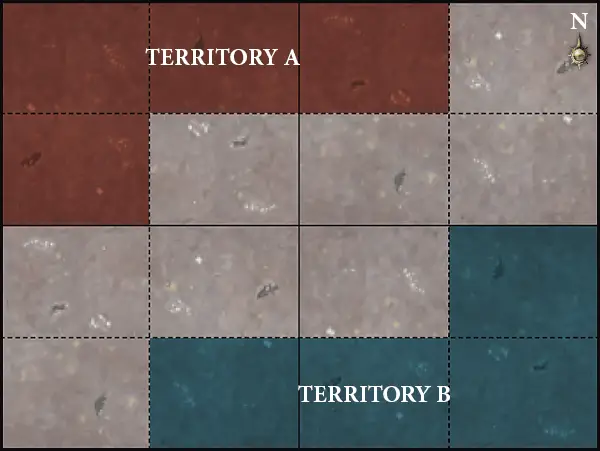 | ||
To attempt to dispel an endless spell, pick 1 endless spell that is within 30" of a friendly WIZARD or friendly PRIEST and that is visible to them. Then make a dispelling roll by rolling 2D6. If the roll is greater than the casting value of that endless spell, it is dispelled and removed from play. An endless spell cannot be summoned again in the turn that it is removed from play.
- Unit champions can issue commands to their own unit (see 22.3.2).
- HEROES can issue commands to units that are wholly within 12" of them.
- Generals can issue commands to units that are wholly within 18" of them.
- TOTEMS can issue commands to units that are wholly within 18" of them.
| You do not have to pick a target for a charge attempt before making the charge roll. | ||
Mortal wounds caused while a unit is attacking are allocated at the same time as wounds caused by the unit’s attacks: after all of the unit’s attacks have been made. Mortal wounds caused at other times are allocated as soon as they are caused. Mortal wounds are allocated in the same way as wounds and are treated in the same manner as wounds for rules purposes.
Sometimes an ability will allow a single hit roll to score two or more hits. If this is the case, make all of the wound and save rolls for those hits at the same time.
Designer’s Note: Save rolls do not always succeed on an unmodified roll of 6, and they can be modified by more than -1.
When you set up a reserve unit, either during deployment or once the battle is underway, you must tell your opponent that the unit is in reserve and keep it to one side instead of placing it on the battlefield. At the start of the fourth battle round, units that are still in reserve are destroyed. Units cannot cast spells or use abilities while they are in reserve unless the spell or ability specifically says it can be used by reserve units.
| Reserve units are picked as part of your army before the battle begins, while summoned units are units added to your army once the battle is underway. Models that have been removed from play can be used as part of a summoned unit. | ||
You can use this command ability when you pick a friendly unit to shoot in your shooting phase or fight in the combat phase. That unit must receive the command. Add 1 to hit rolls for attacks made by that unit until the end of that phase.
A flying model cannot finish a move on top of another model or finish a normal move, run or retreat within 3" of an enemy unit.
| Most rules for artefacts of power refer to the bearer. The bearer is the model to which an artefact of power has been given (see section 27.5.2 for some examples). | ||
The BEASTCLAW RAIDERS keyword is used in the following Ogor Mawtribes warscrolls:
The GUTBUSTERS keyword is used in the following Ogor Mawtribes warscrolls:
You can use this command ability after you make a charge roll for a friendly unit. That unit must receive the command. You can re-roll the charge roll for that unit.
| In most cases, modifiers are cumulative. However, some dice rolls, such as hit and wound rolls, will specify that the roll cannot be modified by more than +1 or -1. When this is the case, add up all the modifiers that apply, and if the total is more than +1 or -1, treat it as being either +1 or -1 as appropriate. | ||
The CITIES OF SIGMAR keyword is used in the following Cities of Sigmar warscrolls:
The WARHERD keyword is used in the following Beasts of Chaos warscrolls:
The KRULEBOYZ keyword is used in the following Orruk Warclans warscrolls:
The STORMCAST ETERNALS keyword is used in the following Stormcast Eternals warscrolls:
Contents | ||

